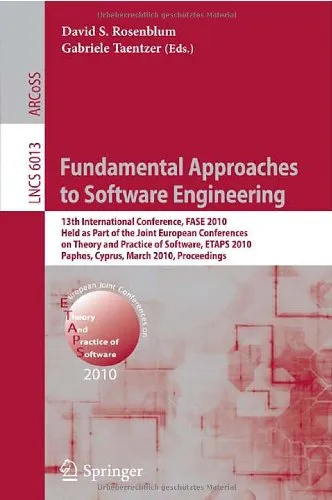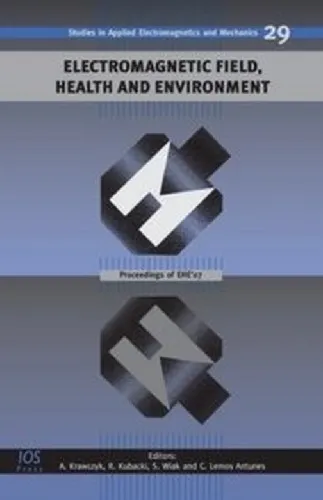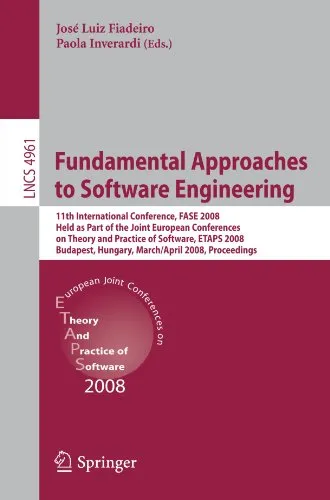Fundamental Approaches to Software Engineering: 13th International Conference, FASE 2010, Held as Part of the Joint European Conferences on Theory and Practice of Software, ETAPS 2010, Paphos, Cyprus, March 20-28, 2010. Proceedings
4.5
Reviews from our users

You Can Ask your questions from this book's AI after Login
Each download or ask from book AI costs 2 points. To earn more free points, please visit the Points Guide Page and complete some valuable actions.Related Refrences:
Introduction
The book "Fundamental Approaches to Software Engineering: 13th International Conference, FASE 2010" serves as a foundational text for understanding the latest advances in software engineering research and their application in real-world scenarios. Compiled as part of the proceedings of the 13th International Conference on Fundamental Approaches to Software Engineering (FASE), held during the Joint European Conferences on Theory and Practice of Software (ETAPS) in Paphos, Cyprus, March 2010, this volume brings together pioneering contributions from thought leaders in academia and industry.
The field of software engineering has always been dynamic and continuously evolving. This book captures the essence of the most pressing challenges, innovative methodologies, and cutting-edge tools that were at the forefront of research in 2010. By analyzing topics ranging from model-driven development and software verification to the latest advancements in testing methods and performance optimization, the book bridges the gap between theoretical approaches and practical implementations.
Through its detailed coverage of concepts and frameworks, the book offers an invaluable resource for researchers, practitioners, and students who are keen to stay ahead in a field that is crucial for today’s technology-driven society.
Detailed Summary of the Book
The work presented in the book spans a wide array of topics in software engineering, ensuring comprehensive and contextual understanding:
- Model-Driven Development (MDD): The book delves into how MDD approaches have transformed the engineering lifecycle by elevating abstraction levels while enhancing productivity and reducing errors.
- Software Verification and Validation: Encompassing state-of-the-art techniques to ensure the correctness and reliability of software systems, this section includes work on automated verification methods and model-checking tools.
- Testing Techniques and Optimization: Methods for optimizing software testing processes, particularly automated and regression testing, are addressed with innovative frameworks and algorithms.
- Performance and Scalability: Several contributions focus on ensuring that systems operate efficiently under diverse conditions, including adaptive designs suited for large-scale environments.
- Integration and Collaboration: Papers in this section explore collaborative methodologies and integrated tools that foster seamless cooperation between teams while ensuring optimal workflows.
Each chapter is meticulously written by experts in the field, contributing original research, detailed analysis, and case studies that bring the outcomes to life.
Key Takeaways
This book is instrumental for readers who desire to stay informed about the latest software engineering principles and practices. The key takeaways include:
- Gaining an in-depth understanding of the role of model-driven approaches in software engineering processes.
- Learning how automated testing can improve accuracy and reduce software development cycles.
- Exploring frameworks that enhance reliability and performance in software systems under varied conditions.
- Understanding theoretical advancements and their direct application to solving practical challenges.
- Engaging with collaboration tools and methodologies to improve team-oriented software development.
Famous Quotes from the Book
“Software engineering is as much art as it is science; its true power lies in bridging complexity with simplicity for human understanding.”
“To verify is to trust. Software verification isn't just about finding faults but instilling confidence in a system’s behavior.”
Why This Book Matters
As the software engineering domain continues to grow in complexity, staying updated with state-of-the-art methods, models, and tools is a necessity for researchers and professionals alike. This book matters because:
- It provides a comprehensive snapshot of the most significant research challenges in software engineering at the turn of the decade.
- The contributions have practical implications, empowering professionals with actionable insights for their projects.
- For academics, it offers a curated set of problems and solutions that can inspire new research directions.
- It exemplifies the collaboration between theorists and practitioners, which is central to innovation in software engineering.
Ultimately, the book symbolizes the enduring commitment of the software engineering community to not only solve current challenges but also anticipate and prepare for future ones.
Free Direct Download
You Can Download this book after Login
Accessing books through legal platforms and public libraries not only supports the rights of authors and publishers but also contributes to the sustainability of reading culture. Before downloading, please take a moment to consider these options.
Find this book on other platforms:
WorldCat helps you find books in libraries worldwide.
See ratings, reviews, and discussions on Goodreads.
Find and buy rare or used books on AbeBooks.
1235
بازدید4.5
امتیاز0
نظر98%
رضایتReviews:
4.5
Based on 0 users review
Questions & Answers
Ask questions about this book or help others by answering
No questions yet. Be the first to ask!













